General
Ngugi revitalizes Pan-Africanism as Mak honours Nyerere
Published
13 years agoon
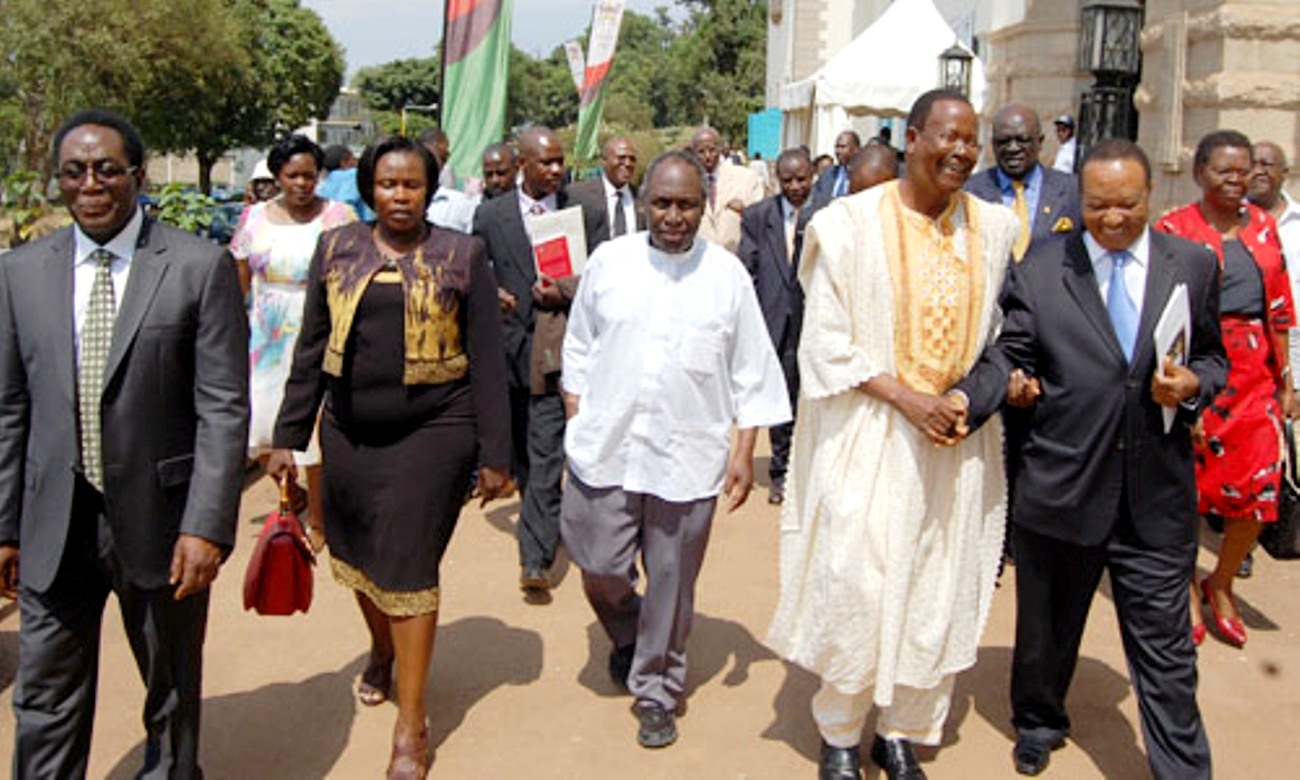
It is the 29th June 2013 at 2:00pm, the Makerere University Main Hall is bustling with activity as alumni, friends, staff members of Makerere University and well wishers stream in to join the historic commemoration of the University of East Africa, UEA, (1963 – 1970). The Main hall is filled with laughter as alumni greet each other with warm passionate hugs and handshakes. It has been years since they last saw each other. It has been years since they last shared a seat in this Main Hall. It has been years since they last returned to Makerere University, where it all started. Some of them have started graying and as they smile, the wrinkles on their faces emphasize the wisdom that only comes with age. All protocol is ignored for now. The alumni of UEA are simply happy to be back home. They walk in and out of the Main Hall to view the exhibitions on the side; as displayed by the three participating universities: Makerere University, University of Nairobi and University of Dar es Salaam. They finally settle in the Main Hall to participate in the other activities of the day.
The University Main Hall is at this moment transformed into what it was in the 1960s, when scholars from the continent and beyond came here to participate in powerful public debate and discourse. It was in this Main Hall that a strong spirit and sense of Pan Africanism was nurtured; a spirit that was to spread throughout the continent and cause major political paradigm shifts and result into independence of some of the African States. To bring this out clearly is the perfect choice of Africa’s celebrated writer, Prof. Ngugi wa Thiong’o, who is set to give a keynote address on ‘Makerere Dreams: Language and New Frontiers of Knowledge.’ Before the Keynote Speaker comes on stage, the Chairperson of Makerere University Council Eng. Wana Etyem welcomes all to Makerere University.
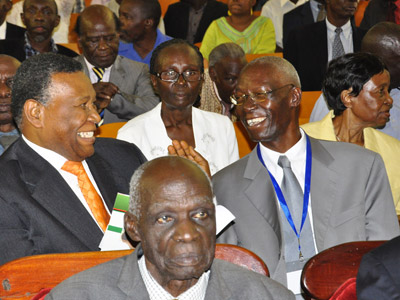
He reminds the gathering that this commemoration is part of the wider celebrations of 90 years of Makerere University and he is grateful for the initiators of the celebrations including former Acting Vice Chancellor, Prof. Venansius Baryamureeba. He is in the same vein grateful to the Vice Chancellor, Prof. John Ddumba-Ssentamu for steering the commemoration to such a tremendous moment. The Chairperson of Council is particularly grateful to the Government of Uganda for the continued support to higher education in the upcoming student loan scheme.
Amidst a thunderous applause, Eng. Wana Etyem then requests the alumni of the University of London and alumni of the UEA to stand up for recognition. They rise to their feet and wave to the crowd with wide jovial smiles. It is a happy hour.
The Keynote Speaker is introduced by the Makerere University Chancellor, Prof. Mondo Kagonyera. “I was one of the first students to register for the UEA degrees. I went to the University of Nairobi. UEA must have been an innocent victim of political ignorance. Is it possible to resurrect the UEA in one form or another?” he wonders. “It is now my singular honour and pleasure to invite Prof. Ngugi wa Thiong’o to give the key note address,” he adds, as the crowd gives a befitting welcome to this illustrious son of Africa, who confidently walks to the podium clad in a white long sleeved shirt and a smile on his face. The Main Hall is filled to capacity, the gallery overflows. In the audience are Government officials including the former Prime Minister Hon. Apolo Nsibambi, cultural representatives like the former Katikiiro of Buganda Eng. J.B Walusimbi, Political leaders like the UPC President Olara Otunnu, Members of Staff from MUASA, MASA and NUEI, representatives from the diplomatic missions and students from both Makerere University and neighboring Secondary Schools.
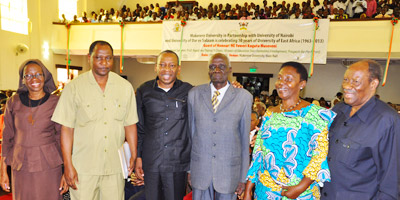
“I find it interesting that people ask me where I was educated every now and then. They hope I will say an American or British University. But I always say I was educated at Makerere University, and I wrote my books in Makerere, Kampala,” said Prof. Ngugi in his opening remarks. “I feel truly grateful for the honour of bringing me back to the scene of many incredible memories. It was on this hill that year after year beginning in 1961, we celebrated the realization of a dream fought for in the streets of Dar, Nairobi and Kampala for over sixty years. The Makerere Student’s Guild with its tradition of free and fair elections had already undermined the colonial practices but anticipated this moment. I entered Makerere University in July 1959, a colonial subject of white settler state and left in 1964, a citizen of an independent black Republic. In a way, Makerere of my time was a personal paradise. Makerere opened the space of my imagination,” he reminisced.
Prof. Ngugi decried the absence of continuous works in native languages. “What we can question is the fact that our various fields of knowledge of Africa are in many ways rooted in the entire colonial tradition of the outsider looking in. Our knowledge of Africa is largely filtered through European languages and their vocabulary. How many historians, Africans and non-Africans alike, have ever written a single document in an African language? How many researchers have even retained the original field notes in words spoken by the primary informant? I have seen prizes being announced for the promotion of African literature but only on condition that the entries are not in an African language. Can you imagine the horror it would raise if someone offered a prize for the promotion of French literature but only on condition that the participants write in Zulu?” he added. He rebuked African governments for turning their backs on African languages by denying them resources.
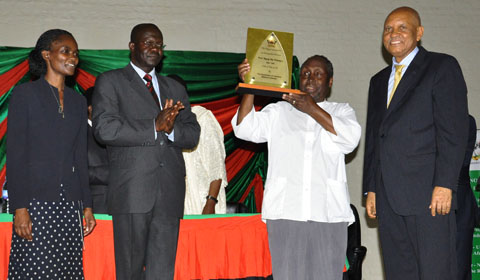
Dr. Okello Ogwang, Dean of School of Languages and Literature and Dr. Susan Kiguli of the same School, presented Prof. Ngugi wa Thiong’o with a plaque for his keynote address and also as a prominent alumni of the school. He had paid a courtesy visit to the School earlier in the morning. The Deputy Vice Chancellor in charge of Academic Affairs. Prof. Lillian Tibatemwa-Ekirikubinza, thanked Prof. Ngugi wa Thiong’o for the address adding that he had indeed sent the congregation into deep thought on the need to generate scholarly material in indigenous languages.
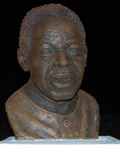
A key highlight of the commemoration was the launch of the Mwalimu Julius Nyerere book, ‘Women’s Freedom: Women are Eagles, Not Chickens,’ and the unveiling of the Mwalimu bust by His Excellency Yoweri Kaguta Museveni, who was represented by Tourism Minister, Hon. Ephraim Kamuntu. The bust stands tall in bronze mounted on a white pedestal in the garden between Edge road and the Makerere University Main Road, overlooking the Freedom Square. From its position, one could rightly say that the late Julius Nyerere, with a smile on his face as seen in this bust, is staring at the historic Freedom Square, to remind all graduating from this Square to stay true to their heritage and carry on the spirit of Pan-Africanism. “With these accolades as the only Chancellor of the University of East Africa which we are celebrating today, it is worthy to have a Mwalimu Julius K. Nyerere Monument on the Main Campus of Makerere University, his proud alma mater.
Mwalimu Nyerere’s efforts perhaps kicked off with his selflessness vision of a united Tanzania. President Nyerere and Sheikh Abeid Karume of Zanzibar were foresighted in uniting Tanganyika and Zanzibar to form Tanzania. The EAC later broke down in 1977 partly because the principled Nyerere was incompatible with Idi Amin,” said Hon. Kamuntu. The former Chairperson of Makerere University Council, Hon. Mathew Rukikaire, who doubles as a former Guild President of UEA in 1963, was grateful to President Yoweri Museveni for laboring to realize the dream of an integrated East Africa engineered by Julius Nyerere.
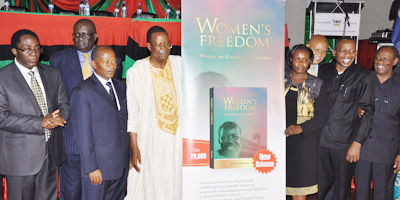
Hon. Charles Makongoro Nyerere, a son to the late Julius Nyerere and a Member of the East African Legislative Assembly, thanked the organizers for honouring his father and emphasized that if Nyerere’s book had been written in current times, it would have indeed brought out many more prominent women both at local and international levels, who have raised to high profile positions. He was also grateful that the Gender Mainstreaming Directorate at Makerere University had deemed it fit to dedicate the proceeds from the sale of Mwalimu Nyerere’s book to help bright but disadvantaged female students attain education. Hon. Makongoro made a humble appeal that something should be done to change the fact that his late father is still the only Chancellor of UEA. He said his father would not have been pleased to remain the only holder of this position forever. 99-year old Mzee Anania Akera, a former roommate of Nyerere in 1944, attended the function to the delight of all, especially the Nyerere family.
Two prominent alumni of the University of East Africa from each country were awarded for their service over the years. The awards were presented by Dr. Martin Aliker, the Chairperson Council of UEA assisted by David Kahundha Muhwezi, the Makerere University Secretary:
- From Makerere University; Prof. Charles Lwanga Mark Olweny, Professor Livingstone Sserwadda Luboobi and Mrs. Geraldine Namirembe Bitamazire, were awarded.
- University of Dar es Salaam awarded H.E President Yoweri Kaguta Museveni and Prof. Issa Gulamhussein Shivji.
- University of Nairobi awarded Prof. (Mrs) Florida Amakobe Karani and Eng. Austin Salmon Kitololo
The Vice Chancellors of participating universities shared their prospects of higher education:
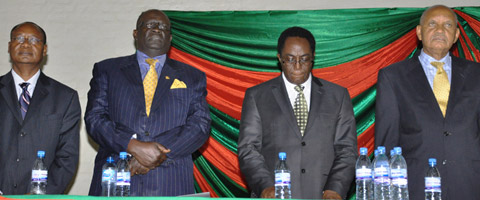
“It has been criminal to keep your child at home for the last 11 years in Kenya. This has been done diligently. A lot of money has been put into this. Kenya has a budget of 1.6 Trillion and education is going to take the biggest part of this budget. Government has invested highly in infrastructure and we now have 33 universities, 14 of which are fully chartered. This has expanded the capacity of the Kenyan students who are currently 370,000; both in private and public universities. Our greatest challenge is in Science and technology. The number of students doing science and technology is about 25% only,” said Prof. George Magoha, the Vice Chancellor of the University of Nairobi. “We have retained our staff because the government has been listening to staff unions. We collect six billion annually and are now focusing on training staff to write proposals. 25% of this budget comes from research,” he added
“The Uganda Vision 2040 provides plans and strategies to transform the Ugandan society from a peasant to a modern, prosperous and competitive upper middle-income country within 30 years. To attain this projected level of development, the country will have to exploit its enormous opportunities including oil and gas, tourism, minerals, ICT business, abundant youthful labour force, strategic geographical location, fresh water resources, industries and agriculture.
These opportunities can only be harnessed through strengthening the physical infrastructure; Science, Technology, Engineering and Innovation (STEI); and above all through concentration on human capital development,” said Prof. John Ddumba-Ssentamu, the Vice Chancellor of Makerere University.
“Some of the interviews for positions in the University of Dar es Salaam were held here. The instruments designed here, so Makerere was the cradle for Dar. Every visit here is an opportunity for us to extend our gratitude. I would like us to focus on the question of whether we still value quality education or we are simply focusing on big numbers of students. The numbers are high of universities, students, lecturers, etc, but we need to ponder on the quality. Do we appreciate the role of education in our emancipation? Yes the three universities are bigger but are they better? Are they universities or simply glorified high schools? Are our universities doing enough, like investing in cooperation amongst ourselves as opposed to cooperation with universities abroad only? Are we spending our meager resources wisely? The resources expended on administrative overheads could be spent in the active involvement of education? I am positive that we will prosper if we provide education in cooperation rather than competition,” advised Prof. Mukanadla Rwekaza, the Vice Chancellor of the University of Dar es Salaam.
A souvenir magazine for 90 years of Makerere University, highlighting the strides taken in research and innovations across the nine colleges of Makerere University and the School of Law, was launched by Education Minister, Jessica Alupo, as part of the celebrations. The magazine, Mak@90, is a product of a partnership between the Public Relations Office of Makerere University and The New Vision. The commemoration was sponsored by UNESCO, which was represented by the Secretary General, Mr. Augustine Omare-Okurut, and the Swedish Government represented by the First Secretary Dr. Patri Pohjolainen.
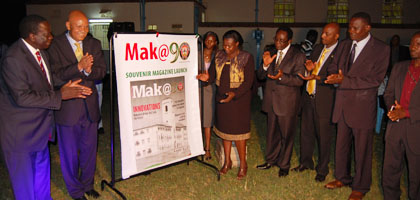
The Guests were treated to a cocktail to wind down the commemoration and entertainment from the Department of Performing Arts and Film (PAF).
Article by Marion Alina
Photo selection by Elias Tuhereze
You may like
-


Meet Najjuka Whitney, The Girl Who Missed Law and Found Her Voice
-


Olivia Nakisita and the Quiet Urgency of Adolescent Refugee Health
-


Makerere Launches Scholarly Guide, Calls for Increased Research, Publication and Innovation in Africa
-
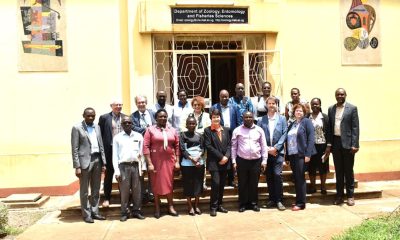

BOKU University Charts New Collaboration Strategies with Mak’s Department of Zoology, Entomology & Fisheries Sciences
-


From Adversity to Excellence: The Inspiring Journey of Makerere’s Best Science Student, Esther Ziribaggwa
-
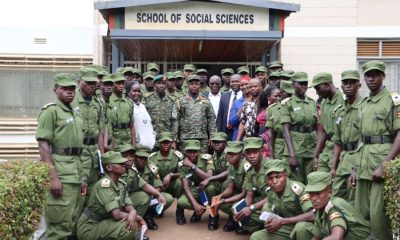

Over 130 Cadet Officers Oriented on Library Use at Makerere University
General
Mak Selected to Host Alliance for African Partnership Africa Office
Published
14 hours agoon
February 23, 2026
Makerere University has been selected to host the Africa Office of the Alliance for African Partnership (AAP). The significant milestone that underscores Makerere’s role in fostering research, innovation, and global collaborations across the continent was announced at a meeting of the University’s Central Management with an AAP delegation on 23rd February 2026.
Makerere’s selection was based on the University’s robust commitment, alignment with the AAP’s Strategic Plan, and proven ability to manage consortium activities. The AAP, which was initiated by Michigan State University (MSU) in collaboration with Ten African Universities and agricultural policy research networks in 2016, targets critical challenges in education, youth empowerment, health and nutrition, agri-food systems, science and technology, water, energy, environment, and culture and society.
Addressing the delegation consisting of AAP Co-Directors from MSU, Dr. Jose Jackson-Malete and Dr. Amy Jamison, accompanied by newly-appointed Director of the AAP Africa Office, Dr. Racheal Ddungu Mugabi and Ms. Clare Cheromoi, the Vice Chancellor, Prof. Barnabas Nawangwe who appreciated the choice of Makerere to host the Africa Office said:
“One of the greatest challenges facing African universities is PhD training, particularly supervisory capacity. Through partnerships such as the Alliance for African Partnership we can leverage international expertise to strengthen supervision—whether through training supervisors or through joint supervision arrangements.”
Prof. Nawangwe equally applauded joint initiatives such as the Grant Writing and Publication project, which gave rise to the establishment of a Writing Centre that he said can be used to build capacity in AAP member universities with Makerere as the hub. Officially launched on 21st March 2023, the project is living up to its expectation of becoming a springboard for strong postdoctoral collaborative research for both institutions and other US universities.
Dr. Titus Awokuse, Vice Provost and Dean for International Studies and Programs at Michigan State University (MSU) who attended virtually, reiterated that Makerere’s selection reflects its long-standing commitment to advancing African higher education, research excellence, and meaningful global collaboration.
Reflecting on the origins of the Alliance for African Partnerships (AAP), Dr. Awokuse explained that nearly a decade ago, MSU initiated a transformative conversation in Atlanta centered on the question: How should we partner differently? From this dialogue emerged AAP—an Africa-centered consortium that now brings together 12 institutions across Africa and the United States.

He emphasized that AAP is grounded in equity, mutual benefit, shared leadership, and deep respect for African priorities and expertise. Since its founding, MSU has served as convener and key supporter, working with member institutions to strengthen research collaboration, promote faculty and student engagement, and address shared development priorities.
Dr. Awokuse underscored that AAP’s success is the result of collective vision and commitment, not the efforts of a single institution. He paid tribute to Lilongwe University of Agriculture and Natural Resources for hosting the Africa Office in its early years and acknowledged the foundational leadership of the inaugural Africa Office Director.
He described the launch of the Africa Office at Makerere University as a significant milestone that reinforces Africa-led leadership, strengthens regional collaboration, and enhances responsiveness to emerging opportunities. MSU, he affirmed, remains fully committed to AAP and to working closely with Makerere and all consortium partners to expand collaborative research, nurture the next generation of scholars, and advance Africa-led solutions to global challenges.
The newly-appointed AAP Africa Office Director, Dr. Racheal Ddungu Mugabi is a member of faculty in the Department of Development Studies, Institute of Gender and Development Studies. Her work on intersectional inequalities in Uganda and other Global South regions uniquely positions her to drive collaborative research and partnerships at the Africa Office.
Initially founded by ten African Universities and MSU, AAP now comprises eleven African members including; the African Network of Agricultural Policy Institutes (ANAPRI)-Zambia, Egerton University-Kenya, Lilongwe University of Agriculture and Natural Resources (LUANAR)-Malawi, Makerere University-Uganda, United States International University-Africa-Kenya, Universite Cheikh Anta Diop-Senegal, Universite Yambo Ouologuem de Bamako-Mali, University of Botswana-Botswana, University of Dar es Salaam-Tanzania, University of Nigeria, Nsukka-Nigeria, and the latest, University of Pretoria-South Africa.
These Universites collaborate under Focal Points to advance policy-relevant research and sustainable development. Makerere University’s Focal Point is Prof. Robert Wamala, Director of Research, Innovations and Partnerships (DRIP).
Addressing the University Management, Dr. Jackson-Malete outlined the African Futures Research Leadership Program, which nurtures early career scholars through mentorship and skill-building as one of AAP’s flagship programs. She noted that the Program that prioritizes female participants or men committed to promoting women in higher education has for the first time during its fifth cohort admitted the first male, Dr. Alfadaniels Mabingo from the Department of Performing Arts and Film, Makerere University.
The AAP Africa Office at Makerere will coordinate activities, boost research collaboration, mobilize resources, and enhance global engagements for socio-economic transformation. This aligns with Makerere‘s broader goals of leveraging international expertise to build resilient institutions.
View more photos from the event: https://flic.kr/s/aHBqjCLjoA
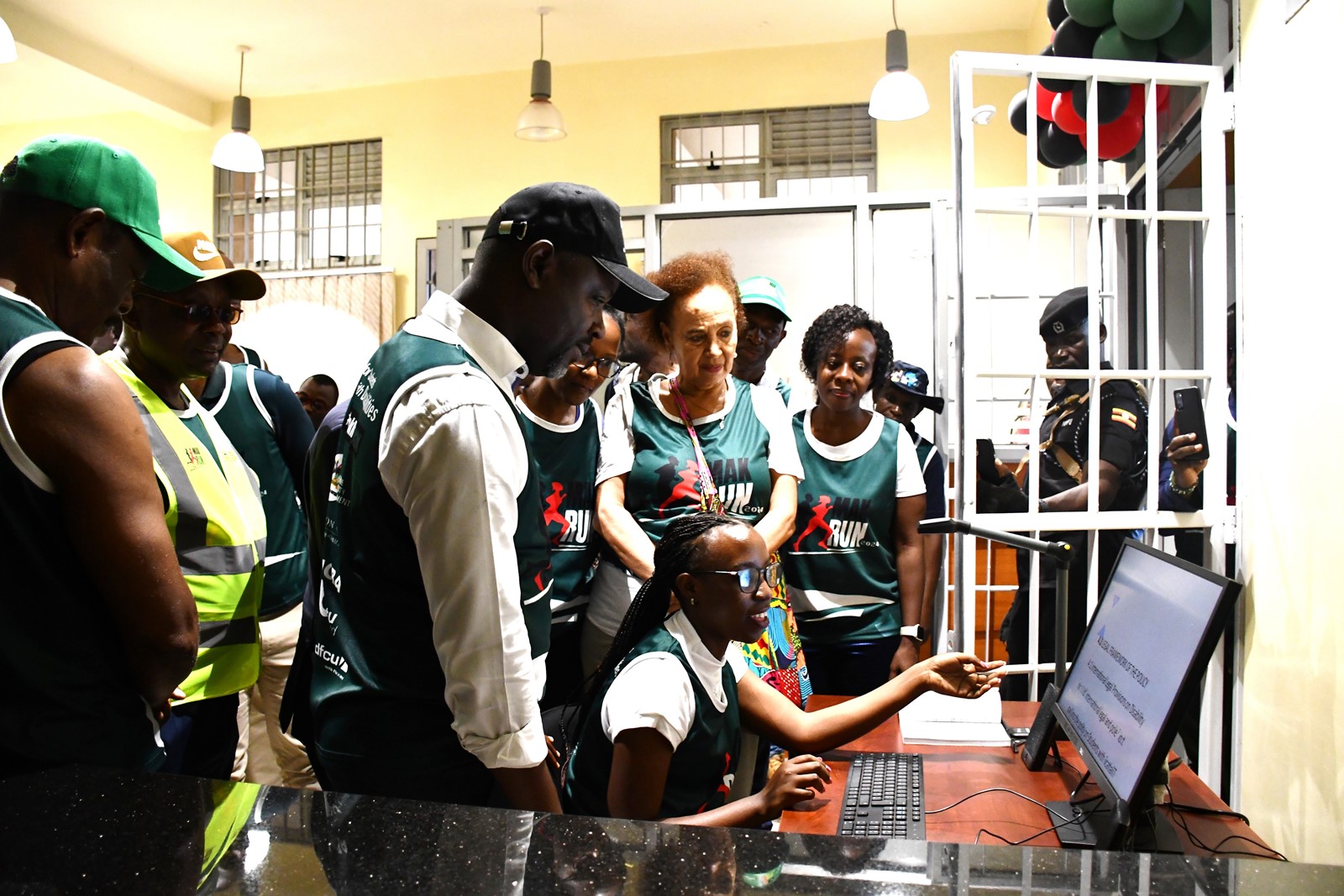
Students with disabilities at Makerere University have been requested to stop seeking for special attention and instead look for solutions and opportunities for personal growth.
This was during a mental wellness, inclusion and safeguarding session organized by the Dean of Students office and the Mastercard Foundation Scholars Program at Makerere University.
Addressing students on mental health and disability inclusion, Mr. Marvin Ggaliwango, a lecturer at the College of Computing and Information Sciences (CoCIS), noted that if the students stop complaining, they will become empowered to take charge of their own development, build resilience and engage confidently in both academic and social environments.
“Turn your lived experiences into tools for innovation. Stop complaining and start creating solutions for yourselves. You are the one living this life, and that gives you the authority to be an expert. When you develop a solution, it doesn’t just benefit you, it helps others too, by removing barriers,” Mr. Marvin Ggaliwango, said.
He encouraged students to see themselves not as victims of circumstance, but as active participants and co-creators of the inclusive environment they wish to experience.
“Learn how to communicate effectively and humbly. If you have a problem, express yourself clearly. Do not isolate yourself or feel resentful. You are not defined by disability, you may face disadvantages, but you still have ability,” he encouraged.
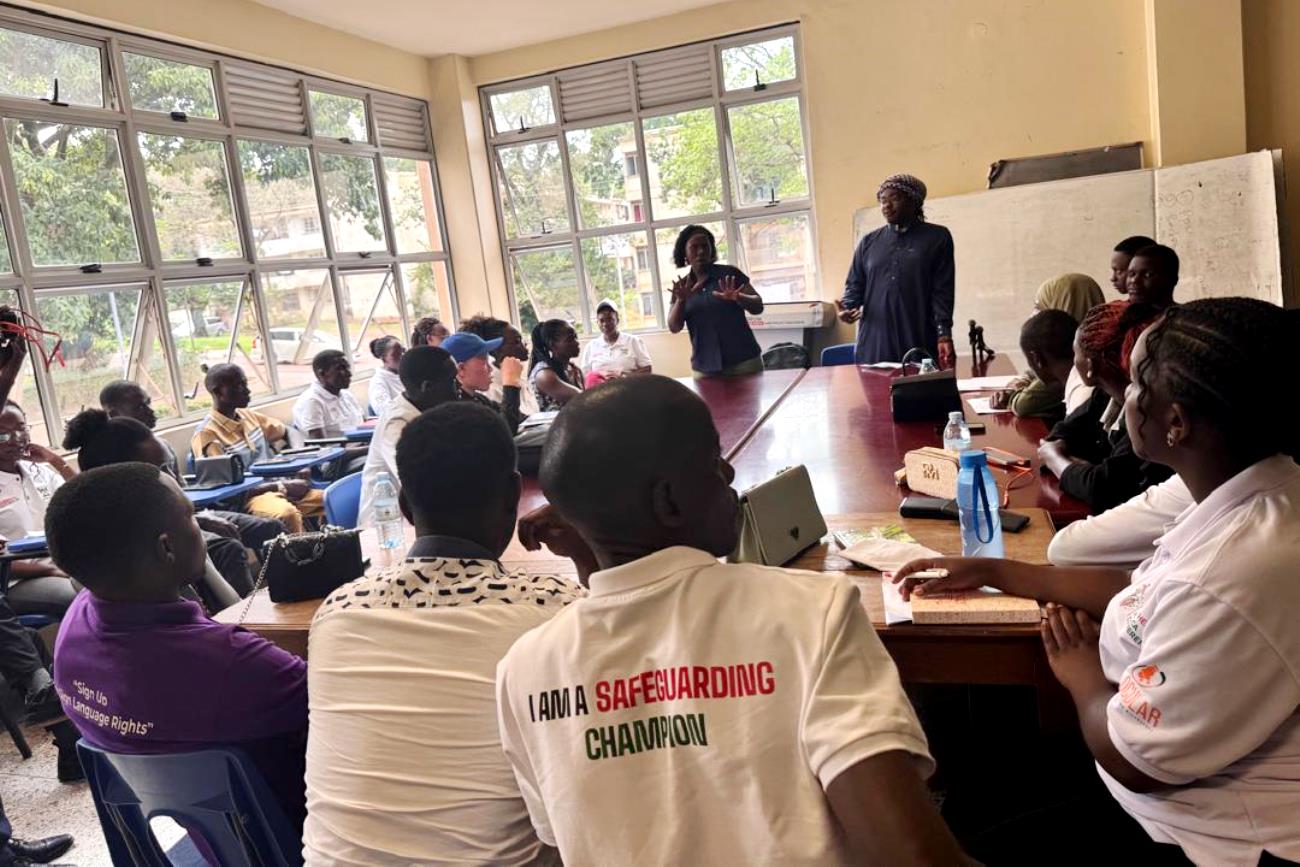
Throughout the session, students listened attentively as he emphasized the importance of self-awareness and personal responsibility, urging them to understand their strengths, acknowledge their limitations and take deliberate steps toward personal growth while contributing positively to the University community.
“We must enhance and ensure that our mental health is number one. Always choose yourself first. Choose what makes you happy and protect your peace. If you are at peace with yourself, your academics will improve. There is a strong link between mental wellness and academic success,” Mr. Ggaliwango, noted.
In his speech, Mr. Musa Mwambu, the Disability Inclusion Advisor at Light for the World Uganda, called upon the students with disabilities to enhance and ensure that their mental health is prioritized.
“As students living with disabilities, sometimes you over expect, because you have a disability you should be given, listened to and when people do not listen to you, you attribute it to your disability, get it from me, even those without disabilities are not listened too. Things are not happening to you because of your disability it is because of the world we live in. Everything that happens to you can happen to others,” Mr Mwambu, noted.
“Have fun with your life. Make yourself happy and be smart. Present yourself in public confidently wherever you go. The way you carry yourself can improve your mental health and how others perceive you,” Mr. Mwambu said.
He reminded the students that gaining admission to Makerere is itself a milestone.
“There are many people without disabilities who have never stepped at Makerere University. Find something that empowers you and hold on to it. You may have a physical impairment, but if you are brilliant in class, you can lead discussions and inspire others,” he added.

During the session, Dr. Rodney Rugyema, the Acting Principal Warden, welcomed the students back from the long holiday. He assured them that the University is committed to their safety and well-being while on campus.
Dr. Rugyema emphasized that the University has systems in place to protect students, both physically and psychologically and encouraged them to report any concerns promptly.
“When you are at the University, you are not on your own, we are always here for you. For us to engage you on mental wellness and inclusion, we want you to be in the right state of mind, whole and complete,” Dr Rugyema, said.
He added: “We are here to empower you and we are calling upon you not be a risk for yourself and always be able to detect risks that are likely to affect your mental health and works towards avoiding them and reporting them to ensure that the University manages them before they escalate into real harm whose impact is more serious than you can think,”
During the session, Ms. Diane Nabikolo Osiru highlighted the University’s broader commitment to safeguarding.
Safeguarding at Makerere University refers to measures put in place to promote safety and wellness of all students, staffs and other stakeholders.
“At Makerere University, safety is not a luxury for few. but it is a right for every student. As the semesters begins, we are urging you to learn how to identify signs of harm or abuses and report them to the appropriate safeguarding contact points,” Ms Nabikolo, said.
For support in case of any harm or abuse, International and Refugee Students, can access support through the Advancement and International Office, while Students with Disabilities, can utilize the Disability Support Center. Those with personal and emotional challenges, can visit the Counselling and Guidance Centre.
In his speech, Dr Joab Agaba, a Lecturer in the College of Computing and Information Sciences, guided students how to report risks and incidences to the MakSafeSpace, the e-reporting platform complimenting the other University traditional reporting channels.
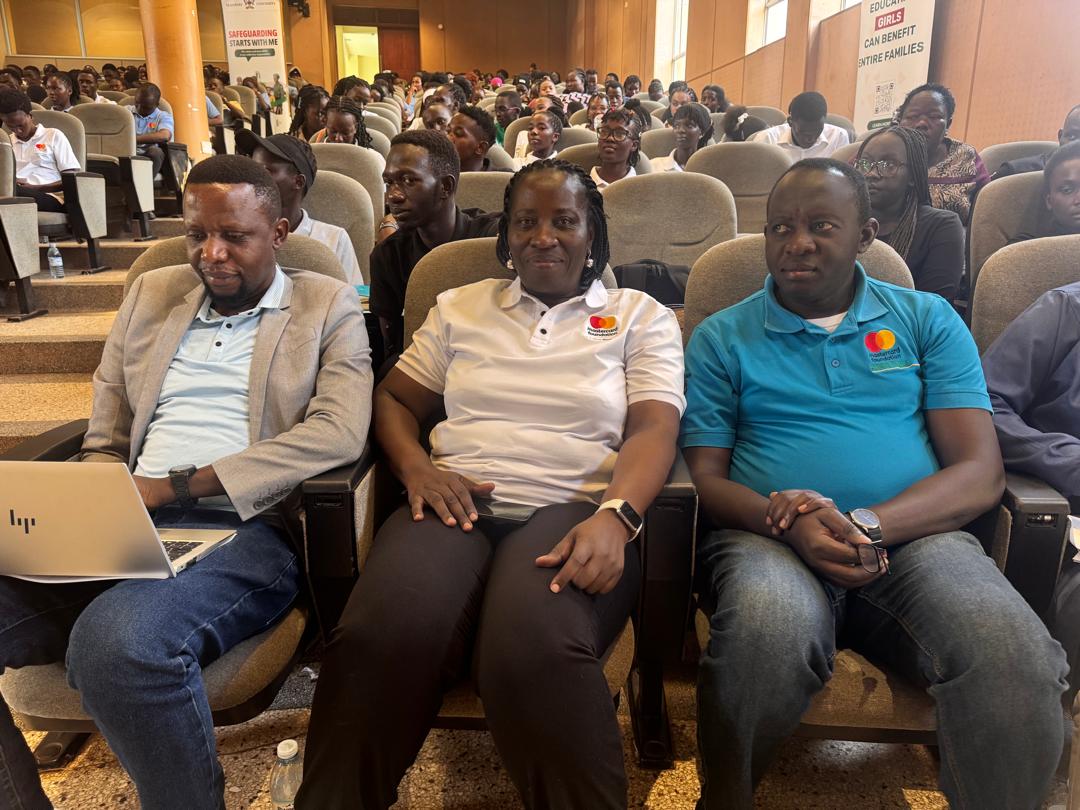
Mr. Henry Nsubuga, the Manager of the Counselling and Guidance Center, shared practical strategies for coping with stress effectively including time management, setting realistic goals, seeking support from peers or counsellors.
Students speak out
Shanitah Nahamya, 2nd year student of the Bachelor of Adult and Community Education
“I have learned how to respectfully and appropriately engage with students with disabilities. In the past, I often felt pity when I encountered them, but now I understand that what they need is not pity, it is respect, support, and equal opportunity.”
Guo Dorothy Geri, 1st year student of the Bachelor of Commerce
“I have learnt how to use inclusive language. Before offering help to a student with a disability, I will first ask them, because not all the time do they need our help. You might think someone wants to be helped to cross the road, yet they are waiting for someone.”
Valentines Doris Aduka, 1st Year student of the Bachelor of Biomedical Science
“I have been calling students with disabilities special names, thinking it was kind. But I have learned that they do not want to be treated differently or labeled in a special way. What they value most is being treated like everyone else, with respect, dignity, and fairness.”
General
Strengthening Global Partnerships to Advance Research, Innovation, and Graduate Training: Makerere University Hosts Delegation from the University of Warwick
Published
5 days agoon
February 19, 2026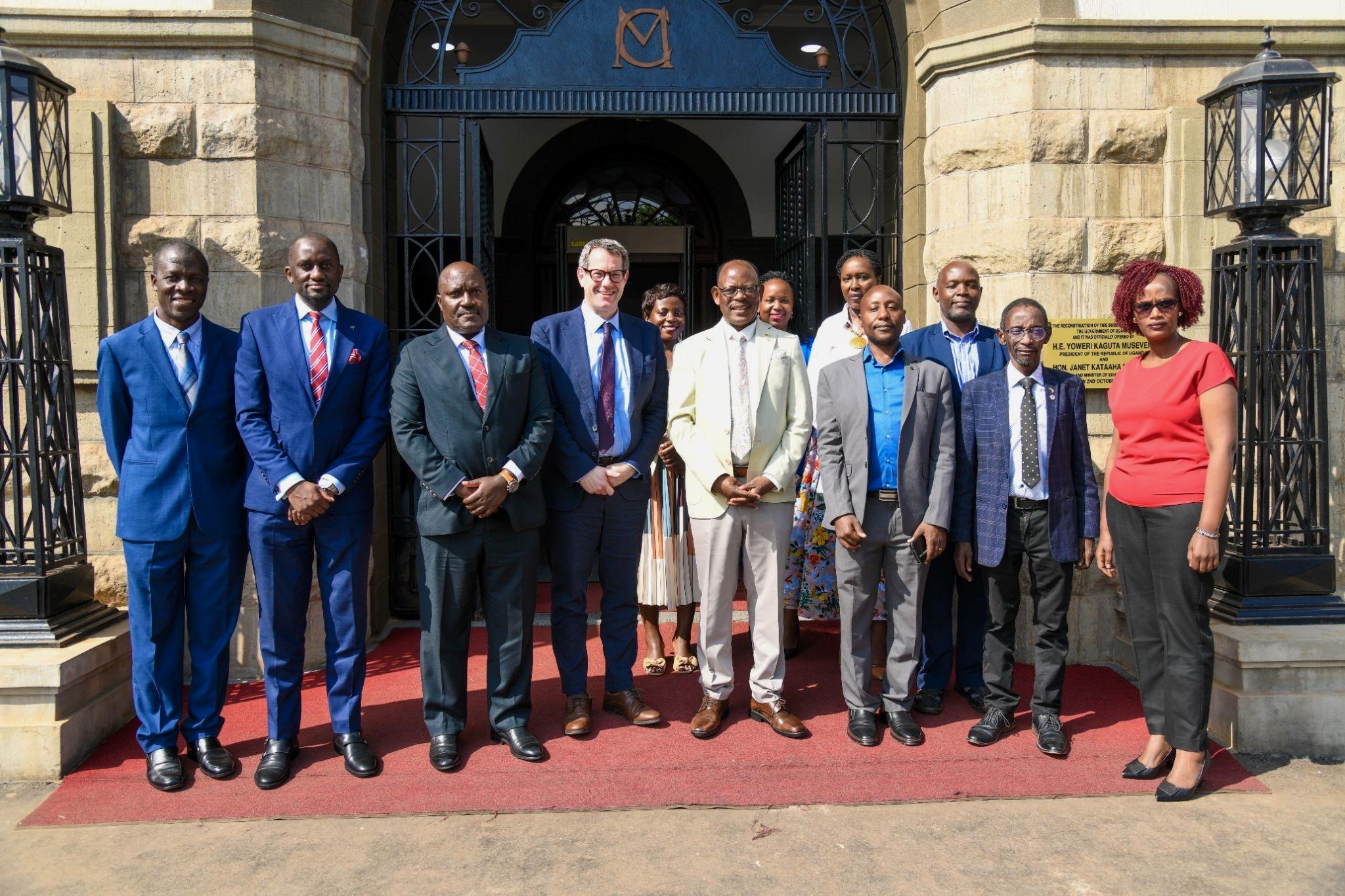
Makerere University continues to deepen its global engagement agenda through strategic partnerships that enhance research, innovation, and graduate training. On Friday, 13th February, 2025, during a recent engagement with a delegation from the University of Warwick (UK), university leaders, researchers, and administrators explored potential collaborations to address pressing development challenges and strengthen institutional capacity.
Expanding Collaboration in Research and Innovation
Welcoming the delegation, Prof. Fred Masagazi-Masaazi, Chairperson of the Makerere University Research and Innovations Fund (Mak-RIF) Grants Management Committee, emphasized the growing dialogue between Makerere University and the University of Warwick. He noted that ongoing discussions are focused on resource mobilization to support research and innovation, as well as building sustainable academic exchanges for both staff and students.
Dr. Roy Mayega, Mak-RIF Coordinator, together with Mrs. Phoebe Lutaaya Kamya, Deputy Coordinator, and members of the Mak-RIF team, highlighted the Fund’s role in catalyzing collaborative research and strengthening partnerships that translate research into societal impact.
Mr. Simon Kizito, Deputy University Secretary, outlined key areas identified for collaboration, including joint research and innovation initiatives, benchmarking visits across disciplines such as law, science, and ICT, and student exchanges designed to strengthen applied research skills. He also pointed to opportunities for training Makerere staff in specialized areas such as tropical diseases and innovation ecosystems, drawing lessons from Warwick’s strong linkages with industry partners located within its campus.
Makerere’s Strategic Priorities and Global Role
In his remarks, the Vice Chancellor underscored the longstanding relationship between Makerere University and the University of Warwick, dating back to the early 1980s, initially through staff training and more recently through collaborative research.
He highlighted Makerere’s historic contribution to leadership development across Africa and beyond, and the University’s continued growth following faculty rebuilding efforts in the 1980s, which have strengthened its research capacity. Today, Makerere has over 1,300 academic staff, more than 1,000 of whom hold PhDs, positioning the institution to play a leading role in knowledge production.
The Vice Chancellor also outlined major thematic areas where partnerships are critical:
- Climate change and food security: Researchers at the College of Agricultural and Environmental Sciences (CAES) are developing drought-resistant and high-yield seed varieties to address changing weather patterns and food insecurity.
- Public health and infectious diseases: Uganda faces frequent outbreaks of diseases such as Ebola and Marburg, and Makerere has built strong capacity in outbreak response and tropical medicine. The University’s medical school and the Infectious Diseases Institute (IDI) continue to play a pivotal role in research and treatment.
- Peace and conflict studies: Through initiatives such as the Rotary Peace Centre, Makerere contributes to training global leaders in conflict resolution.
- Climate-sensitive macroeconomic modelling: Makerere recently hosted a conference in collaboration with the Ministry of Finance, Planning and Economic Development to advocate for climate-responsive macroeconomic modelling and to plan for the establishment of a Centre of Excellence in this field.
- Innovation and technology: The University’s innovation ecosystem has produced notable outputs, including Africa’s first electric vehicle and ongoing work to expand incubation facilities to enable students to graduate with viable enterprises.
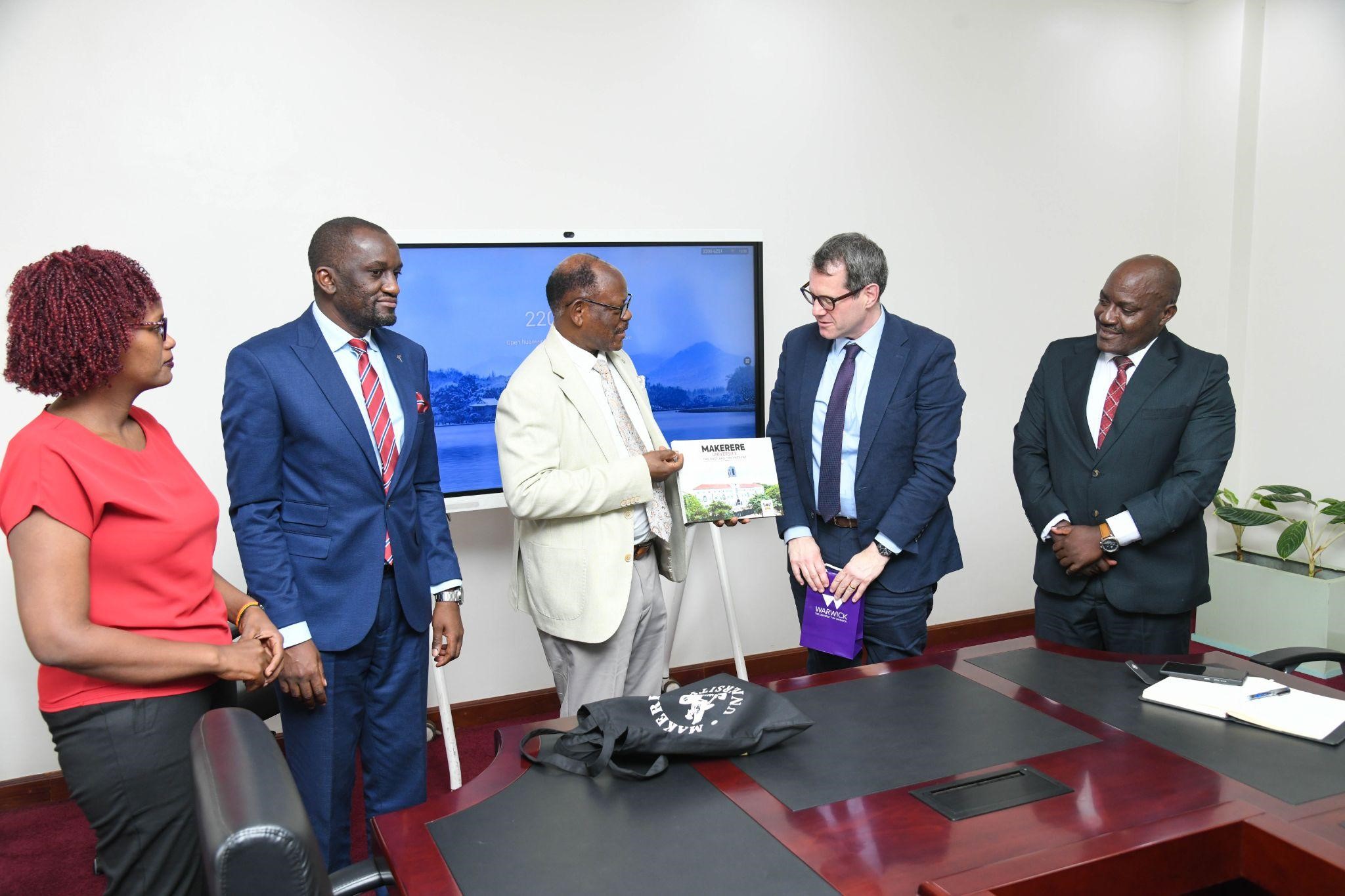
The Vice Chancellor emphasized that addressing youth unemployment remains a central priority, noting that innovation, entrepreneurship, and graduate training are essential to building stable societies.
He further stressed the importance of expanding graduate education. Africa currently produces a small proportion of global research output, and increasing PhD and Master’s training supported by international partnerships remains critical to accelerating knowledge production and development outcomes.
Internationalization and Shared Learning
Speaking on behalf of the University of Warwick, Professor Daniel Branch, Deputy Vice Chancellor, reflected on Warwick’s own institutional journey, noting that its growth has been driven by a strong focus on internationalization, innovation, and research. He expressed Warwick’s commitment to building productive partnerships with African universities, including Makerere, to advance joint research, training, and innovation.
Professor Branch also highlighted the importance of university-industry linkages, citing examples such as collaborations with major manufacturing firms that provide practical training opportunities and inform curriculum development.
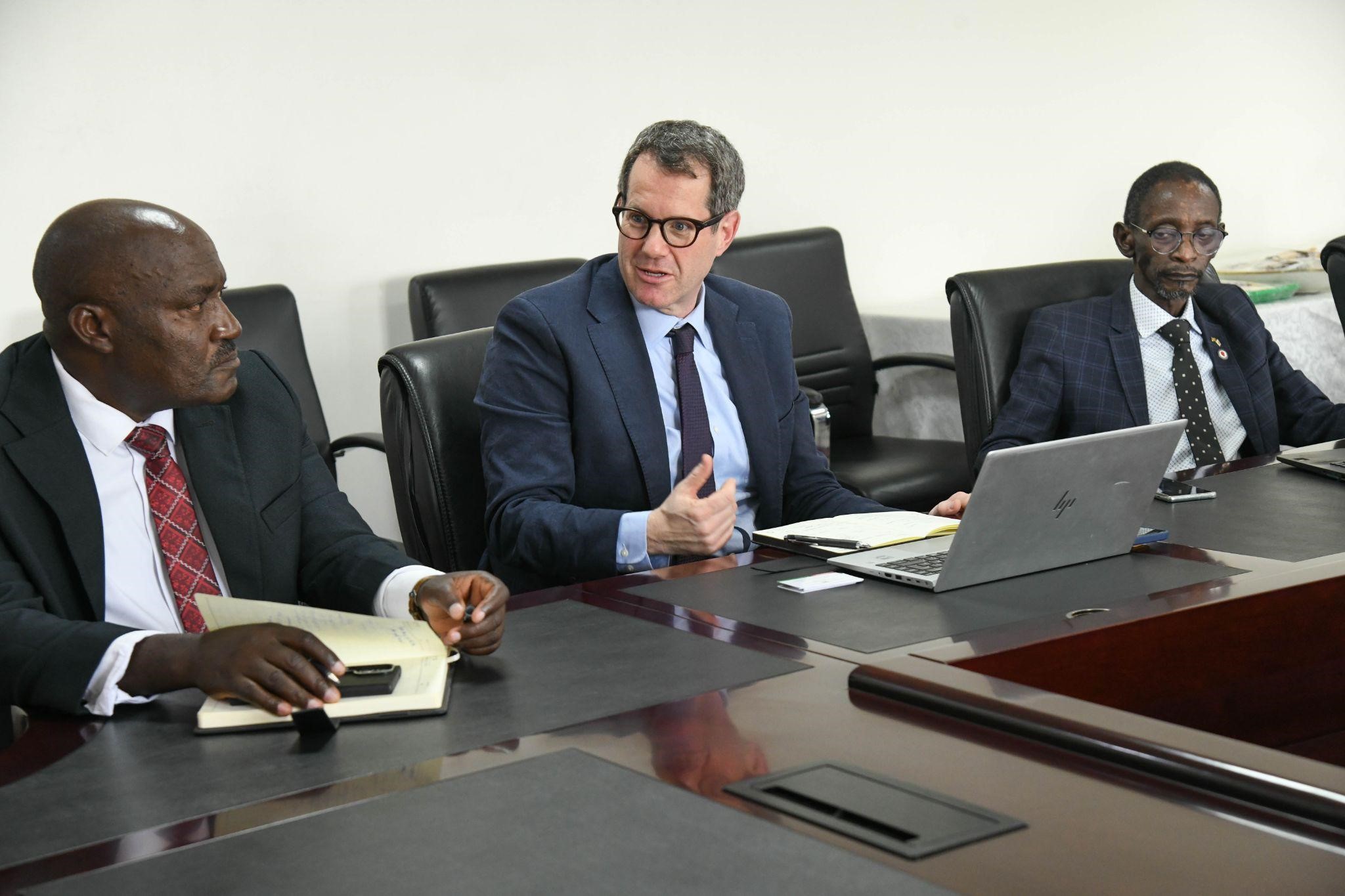
Showcasing Research and Innovation at CEDAT
A second session of the engagement was held at the College of Engineering, Design, Art and Technology (CEDAT), where academic leaders and researchers presented ongoing work across multiple disciplines.
Presentations included:
- Development of a solar water pump through reverse engineering (Dr. Edmund Tumusiime)
- Crane Cloud, a locally developed cloud-computing platform (team from the College of Computing and Information Sciences)
- Profiling gaseous emissions associated with burnt bricks (Dr. Nathan)
- Integration of centralized grid and decentralized renewable off-grid systems: a techno-economic analysis (Dr. Abubaker Waswa)
- Innovation and digitalization pathways for affordable housing in Sub-Saharan Africa (Prof. Stephen Mukiibi)
The session was attended by CEDAT leadership, including the Principal, Prof. Moses Musinguzi, as well as deans and heads of department from engineering, built environment, and industrial and fine arts. The day’s activities were concluded with a tour of Makerere University’s Innovation Hub.
The engagement reaffirmed Makerere University’s commitment to building strong, mutually beneficial partnerships that accelerate research, strengthen graduate training, and drive innovation. As global challenges such as climate change, public health threats, and youth unemployment intensify, collaboration among universities remains essential to developing scalable, evidence-based solutions.
Through partnerships such as the one Makerere University and the University of Warwick hope to activate through a Memorandum of Understanding in the near future, Makerere continues to position itself as a leading research-intensive university dedicated to transforming society through knowledge, innovation, and global cooperation.
Caroline Kainomugisha is the Communications Officer, Advancement Office, Makerere University.
Trending
-

 General2 weeks ago
General2 weeks agoAptitude Exam (Paper 1) Results for the Mature Age Entry Scheme 2026/2027
-

 Health5 days ago
Health5 days agoUganda has until 2030 to end Open Defecation as Ntaro’s PhD Examines Kabale’s Progress
-

 General6 days ago
General6 days agoMastercard Foundation Scholars embrace and honour their rich cultural diversity
-

 General2 weeks ago
General2 weeks agoFor Youth by Youth – Call for Second Cohort Applications
-

 Agriculture & Environment4 days ago
Agriculture & Environment4 days agoUganda Martyrs Namugongo Students Turn Organic Waste into Soap in an Innovative School Project on Sustainable Waste Management
